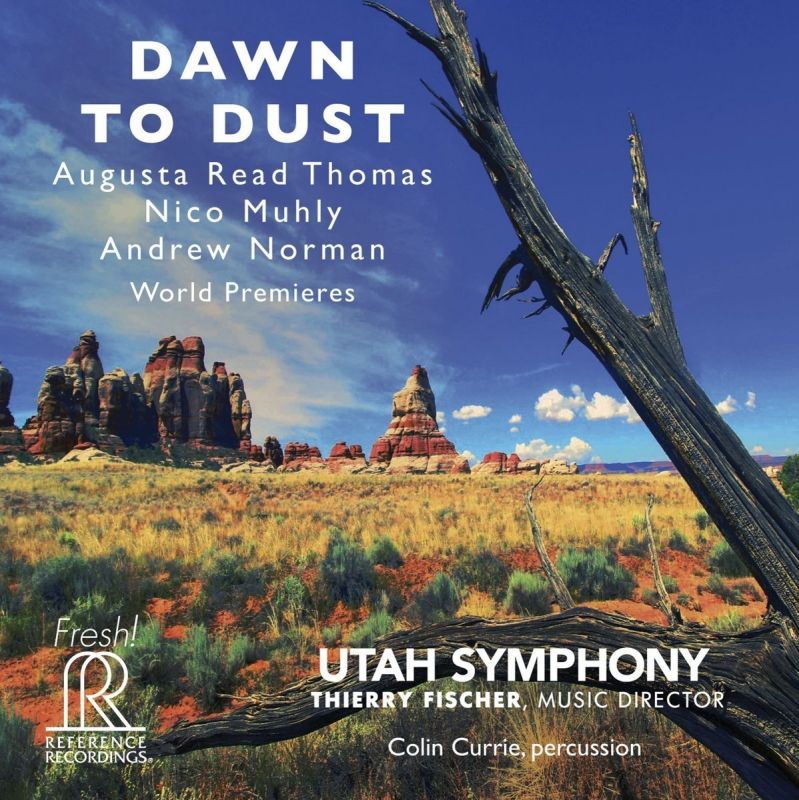READ THOMAS EOS MUHLY Control NORMAN Switch
View record and artist detailsRecord and Artist Details
Composer or Director: Andrew Norman, Nico Muhly, Augusta Read Thomas
Genre:
Orchestral
Label: reference
Magazine Review Date: 07/2016
Media Format: CD or Download
Media Runtime: 69
Mastering:
DDD
Catalogue Number: FR719SACD

Tracks:
| Composition | Artist Credit |
|---|---|
| EOS (Goddess of the Dawn) |
Augusta Read Thomas, Composer
Augusta Read Thomas, Composer Thierry Fischer, Conductor Utah Symphony Orchestra |
| Control (5 Landscapes for Orchestra) |
Nico Muhly, Composer
Nico Muhly, Composer Thierry Fischer, Conductor Utah Symphony Orchestra |
| Switch |
Andrew Norman, Composer
Andrew Norman, Composer Thierry Fischer, Conductor Utah Symphony Orchestra |
Author: Kate Molleson
First comes the five-movement EON (the goddess of the dawn) by Augusta Read Thomas, who knows what she wants from an orchestra: a sound that is ‘always luminous and never muddy’, she writes. There’s certainly a lot of light in her music, with clear space between the wholesome horns and triangles of ‘Shimmering’ or the chimes and bass clarinets of ‘Spring Rain’. This is neat, well-crafted writing – but Read Thomas also aims to imbue the music with her ‘physical and mental sense of caprice’ and, to me, all that neatness negates any real sense of caprice. Thierry Fischer conducts diligently, without a great deal of wildness.
There is one looming template when it comes to capturing Utah’s landscape in orchestral sound: credit to Nico Muhly for acknowledging Messiaen’s visionary 1972 work Des canyons aux étoiles… upfront in his booklet-notes. But where Messiaen conjured the rocks and expanses in magnificently mystic terms, Muhly’s prosaic language doesn’t come close. His piece, Control, is dense with references to Utah’s history, incorporating an Ute tobacco song, technological innovations (wagons, fibre internet connections) and 90-year-old graffiti etched next to a petroglyph. But the music is less interesting than the blurb. Opening flutes and harps are shattered by jutting heavy brass – maybe Muhly still remembers John Adams’s comment that ‘at times there is a surfeit of prettiness in Nico’s music’. But prettiness wins out in the ecstatic chimes and chattering winds of ‘Mountain’ (‘insect-like punctuations’) and in the pert interlocking rhythms of ‘Beehive’ (‘morse-code-like’). The Muhly formula of bright sounds doing busy things, dark sounds doing rousing things and momentum driven forward by swells and crescendos begins to wear thin by the final movement.
So the rush of unchecked energy and invention in Andrew Norman’s Switch comes as a thrill. This 30-minute span features an ultra-alert Colin Currie and is also where you’ll find the finest orchestral playing of the collection: Fischer keeps Norman’s colours super-bright, his pinball rhythms bouncy and tight, and the ensemble responds with impressive nimbleness – the winds and brass have a gloss and gusto that set textures ablaze. There’s a brilliantly elastic sense of play between soloist and orchestra, with every percussion instrument setting off a fun reaction in some part of the orchestra. One of my favourite moments comes when a choir of high winds breaks away from the throng and ascends up and up as if unstoppable for the sheer joy of it.
Discover the world's largest classical music catalogue with Presto Music.

Gramophone Digital Club
- Digital Edition
- Digital Archive
- Reviews Database
- Full website access
From £8.75 / month
Subscribe
Gramophone Full Club
- Print Edition
- Digital Edition
- Digital Archive
- Reviews Database
- Full website access
From £11.00 / month
Subscribe
If you are a library, university or other organisation that would be interested in an institutional subscription to Gramophone please click here for further information.




